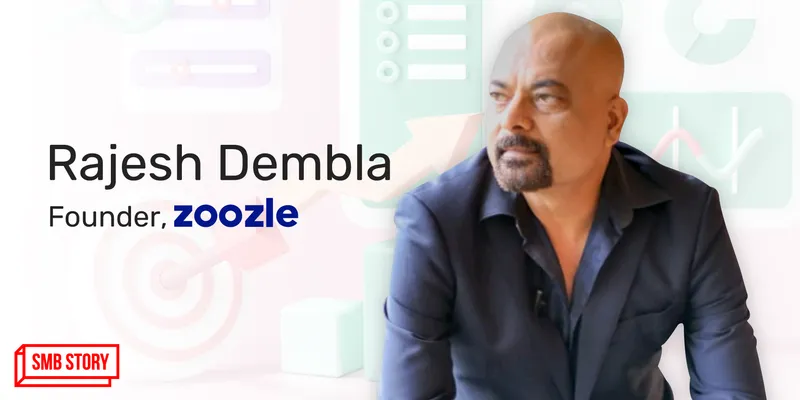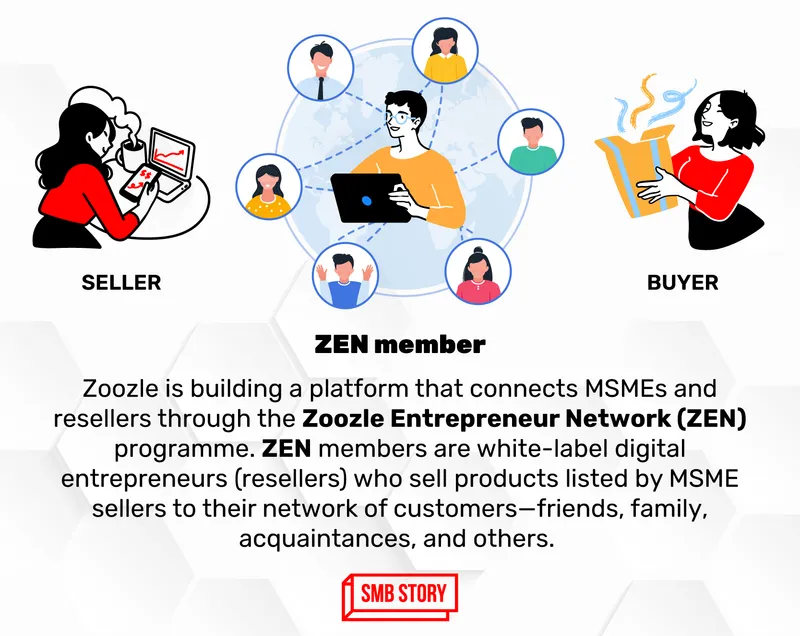Zoozle hopes to crack the profitability paradox with its reseller-centric ecommerce platform
Through Zoozle, angel investor Rajesh Dembla aspires to build a sustainable ecommerce platform that connects MSMEs and resellers and addresses the perennial challenge of profitability.
Profitability in the competitive world of ecommerce has remained a paradox for many homegrown ecommerce players, despite India being one of the largest consumer markets globally.
Entrepreneur and angel investor Rajesh Dembla hopes to tackle the profitability challenge with his latest venture .
Dembla—who has invested in brands such as , , and —has ventured into the ecommerce space with a reseller-driven platform that strives to keep processes lean, efficient and organised. The Zoozle platform has also done away with the cash-on-delivery option, considered a financial risk for sellers.
Since its inception in April this year, Zoozle has built a network of more than 14,000 resellers and facilitated over 1,000 transactions. The company’s goal is to have a network of 2 million resellers by the end of 2024.
A reseller platform isn’t a new concept in the ecommerce landscape, with players such as Meesho having dabbled with it in the past. started out as a reseller platform in 2015, enabling Indian women to resell products listed on the platform via WhatsApp and Facebook. But, over a period of time, it veered towards a buyer-and-seller-centric ecommerce platform.
Given that the model has seen somewhat mixed results so far, how bullish is Dembla about Zoozle’s fortunes?
Dembla reposes faith in the reseller model and believes this is where profitability lies. He believes a reseller model—compared to a traditional marketplace—eliminates the need for huge spends on customer acquisition.
“The resellers promote products to their social network, friends, relatives, neighbours and colleagues. This way Zoozle will grow really fast and efficiently, which will in turn help to get to profitability really fast,” Dembla tells SMBStory.
Zoozle currently caters to 37 cities across India, including Tier I and II towns, and deals with product categories such as sarees, dress materials, home decor, lifestyle, home furnishing, jewellery, and car accessories.

Win-win for MSMEs and resellers
Zoozle is building a platform that connects MSMEs and resellers through the Zoozle Entrepreneur Network (ZEN) programme.
ZEN members are essentially white-label digital entrepreneurs (resellers) who sell products listed by MSME sellers to their network of customers—friends, family, acquaintances, and others.
Thus, through this platform, MSMEs get access to a large pool of customers, whom they may not be able to reach otherwise.
As for the resellers, they get access to a wide range of products, which they can sell to their network and earn a margin on the selling price. They need not make any initial investment or hold inventory; the logistics are borne by the primary sellers.
“In India, there are so many micro distributors but in an unorganised way. We see women reselling apparel, home decor items, jewellery etc, in their societies, colonies and even in their friends and family circle. But we are doing it in an organised way for MSMEs,” says the Zoozle founder, who had bootstrapped the company with funds raised in his personal capacity from friends and family.
“This mutually beneficial arrangement transforms the resellers into micro distributors, amplifying the brand’s reach and sales potential. The earnings are transparent and resellers can see the amount of money they will earn while selling the products,” Dembla elaborates on the benefits of the platform.
Samadrita Majumdar, a working professional from Tripura, onboarded herself as a reseller on ZEN around a few weeks ago. She says, within a few days, she received around seven orders. “I do not have to do anything like holding stock or making a product; I just market the products in my network and earn a commission,” she adds.
Dembla says Zoozle was formed with a vision of supporting Indian businesses with only ‘Made in India’ products to reach end-customers—where both the business owner and the reseller would earn without engaging in any price war, which is generally associated with ecommerce.
Zoozle does not place the burden of running ad campaigns on small business owners (MSMEs). The brands’ visibility is ranked based on customer experience. The brands with good ratings from customers on order service are shown on top. On the Zoozle platform, a reseller can create a separate store to showcase and sell products.
Zooozle also provides MSMEs and resellers access to its business coaching videos, which are integrated within the platform.

Zoozle's ZEN business model
Revenue model
In return for opening its doors to a large number of resellers, Zoozle earns a fixed commission from the brands/MSMEs.
Apart from ZEN, Zoozle also offers ZEN Pro, wherein resellers get a customised domain name within the app and earn a higher commission. Resellers are charged Rs 99 + GST per month for ZEN Pro membership.
Doing away with COD
While several issues hurt the ecommerce sector, one of the primary reasons for the lack of sustainable profits is the cash on delivery (COD) model and the no-questions-asked returns-and-exchange policy, which result in a financial burden for the ecommerce platform and the MSME sellers.
To address this issue and attract only serious buyers, Zoozle has eliminated COD on its platform. While this may initially alienate a set of buyers who prefer the COD option, Dembla believes this is the way to go.
“Initially buyers may take time to buy from us; we will win them with great quality products, sold to them in a secure manner,” he says.
“All platforms will slowly shy away from COD,” Dembla says, adding that Zoozle is one of the few early companies to lead this change.
Zoozle has also put in place a policy that accepts returns only on damaged or defective products. To ensure a smooth return process, the platform requests customers to provide an unboxing video as supporting evidence for their claim.
Ultimately, the process is beneficial to customers, Dembla emphasises.
“We are very protective of our buyers. Once the buyer has ordered on Zoozle, the payment is secure with us; it’s like an escrow. We do not pay the seller until seven days after the buyer has received the product and has no claim to return due to damage or the wrong product being delivered.”
Sustaining Zoozle going forward
The social commerce market size in India was valued at $1.5 billion - $2 billion in 2020. It is expected to reach $16 billion - $20 billion by 2025, at a CAGR of 55-60%.
Social commerce and reseller platforms have faced issues such as lower ticket sizes, increased returns in the fashion category, lower product standardisation, longer delivery schedules, higher COD orders (which led to lower profitability), and average customer experience.
“At this time, social commerce companies are leveraging influencers and user-generated content to create product awareness and reach customers in smaller Tier II and III cities. Companies now educate resellers in smaller cities about shoppable content for a seamless purchasing experience,” says Anand Ramanathan, Partner, Deloitte India. “They are also prioritising reseller-buyer feedback, providing consumers with reassurance that their concerns can be addressed and resolved.”
These are some developments that Zoozle may want to look into in order to control quality and sustain and scale its business in the long run.
Edited by Swetha Kannan







